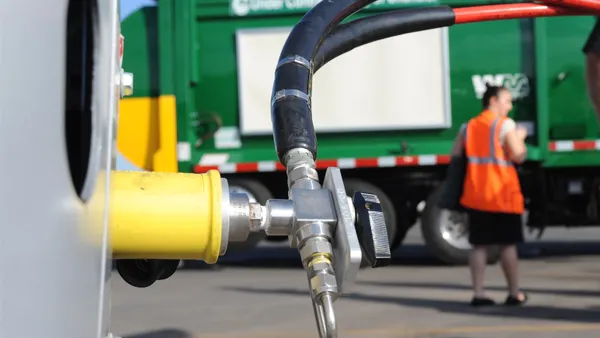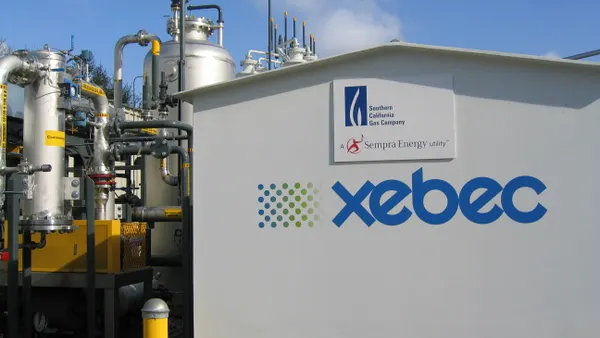UPDATE: April 23, 2020: Baltimore will appeal a federal court ruling that struck down the city's Clean Air Act in favor of Wheelabrator and other opponents. City Solicitor Dana P. Moore said Wednesday that Mayor Bernard Young had authorized her to appeal, according to the Baltimore Brew. Community activists pushed for the appeal that same day as part of Earth Day protests.
In his 24-page ruling on March 27, Judge George Russell dismissed several of the plaintiffs' claims — including that they were unfairly targeted — but ultimately found the Baltimore ordinance at odds with both state and federal regulatory authority. Michael O’Friel, Wheelabrator senior vice president, said in a statement at the time he was "pleased" with the ruling and called the city legislation "fundamentally flawed."
Dive Brief:
- Baltimore has agreed to a stay of the city's Clean Air Act until a lawsuit with several parties, including Wheelabrator and Curtis Bay Energy, is resolved. The decision came after a Jan. 29 teleconference call between city officials, plaintiffs and the U.S. District Court of Maryland.
- Judge George L. Russell issued a memorandum following the call that denied the plaintiffs' request to stay the Clean Air Act because the city had agreed to voluntarily do so. "Additionally, the deadline for implementation of the Act will be tolled... until the Court issues a decision on the merits of the pending motions," the judge wrote in a Jan. 29 order.
- The law's first phase was set to go into effect in September 2020, but the case could now drag on past that point. Mike Ewall, executive director for the Energy Justice Network, told Waste Dive the situation could easily last for "a year or two" depending on how various legal elements of the case unfold.
Dive Insight:
Tensions between Baltimore and Wheelabrator have come to a head in the time since the Clean Air Act was passed by the city in February 2019.
Under the law, city incinerators would need to initially monitor 20 different pollutants, including the strictest standards in the country for both mercury and sulfur dioxide. Beginning January 2022, Baltimore would also extend those strict standards to nitrogen oxides and dioxins as part of the second phase of the law. Additionally, operators would need to disclose that data in real time on a website.
City council members unanimously approved the law with support from health and environmental organizations. Wheelabrator's site in downtown Baltimore has been a source of controversy for many years since its opening in 1985. The site brings in around $7.3 million annually in host fee revenue for the city, but concerns over environmental justice have shifted public opinion, driving momentum behind the Clean Air Act.
Two facilities — Wheelabrator Baltimore and the Curtis Bay Baltimore Regional Medical Waste incinerator — would be directly affected. The Energy Recovery Council (ERC), the National Waste & Recycling Association (NWRA), and TMS Hauling joined both companies in their lawsuit against the city last spring. They argue the law is an "illegal effort" that imposes "extraordinarily low emission limits and other mandates that the City has no authority to require."
Two amicus briefs have since been filed in the case. One is from the Energy Justice Network in favor of the city, while the other is from a group called the Local Government Coalition for Renewable Energy. That group consists of 11 local governments that own incinerators in nine states, but the city has objected to its filing. Covanta holds operating contracts with a majority of the facilities involved in the coalition, and owns one in Marion County, Oregon. The company is also a member of ERC, so Baltimore argues Covanta is represented more than once in the case.
Neither ERC nor Covanta responded to requests for comment from Waste Dive. The coalition's amicus brief argues waste-to-energy facilities play an important role in cities like Baltimore, adding the city's law "is at odds" with current environmental standards put in place by both the U.S. EPA and Maryland Department of Environment.
"Waste-to-energy facilities provide a diverse set of increasingly important environmental benefits to the communities they serve as well as the nation at large," the brief asserts, in a nod to the methane emissions associated with landfills.
The coalition also seconds Wheelabrator's assertion that the law aims to shut down the company's incinerator and called comments about the situation from city officials "powerful evidence of the ordinance's illegality."
Andre Davis, city solicitor for Baltimore, told Waste Dive it is "routine" for governments to halt implementation of legislation until a court has been able to rule on its constitutionality or reached a decision on pending motions. "We expect a decision by the court in the near future," Davis said via email.
Wheelabrator did not respond to a request for comment from Waste Dive regarding the city agreeing to stay the law while litigation moves forward.
Ewall, of the Energy Justice Network, indicated the lawsuit could be a precedent for similar cases in other parts of the country, including in Albany County, New York, which is embroiled in a fight over a cement plant burning tires for fuel.
"We know other places are watching this," he said.









